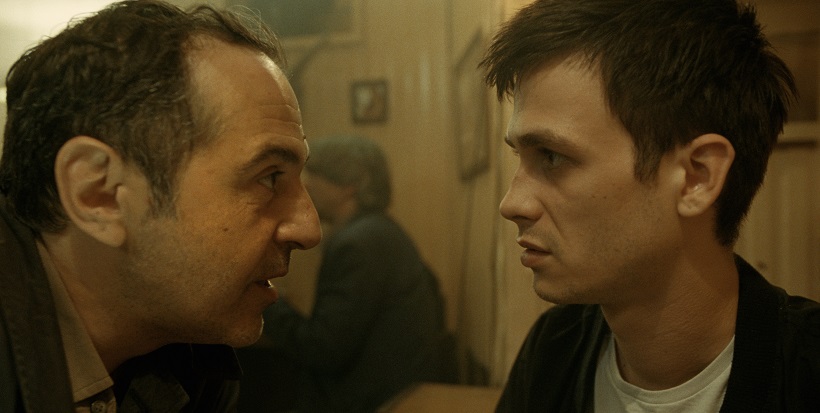Rungano Nyoni’s debut feature premiered at last year’s Directors' Fortnight in Cannes, and immediately marked the Lusaka-born, Wales-raised director down as a figure to watch. Putting her film into any category is more challenging, though, with its elements of fable and somewhat surreal satire, although “surreal” and any associated hints of the absurd risk saying more about the perspective of the observer than the world Nyoni herself depicts.
But however you look at it, I Am Not a Witch is a startling, vibrant piece of filmmaking. Over a spare 90 minutes Nyoni follows her nine-year-old heroine on an unlikely journey: rejected from one community because she stands out as an unlucky outsider, she is attached to a state-supported witch colony, then exploited as a curiosity and for commercial ends by her semi-official “minder”. The name she is given by the community of much older women into which she is partly absorbed is Shula, which tellingly means “uprooted”. She’s outstandingly played by Maggie Mulubwa, a tribal girl found by Nyoni, whose silence through most of the film leaves her face to speak, indelibly, about unspoken fear and apprehension and plaintive bafflement. There’s such sadness there: the few moments when Shula seems to be discovering something about herself, for herself, are so tentative that the film’s conclusion almost comes as a tragic relief. In parallel to the wider position of women in society, Nyoni has come up with an unnerving central image for her community of witches: they are tethered on long ribbons, attached to huge bobbins, that supposedly prevent them from flying away. Her opening scene shows a witch camp (the director spent time in one such place, in Ghana) being visited by tourists, a pitiful place where impassive old women sit around apathetically, their faces daubed in white.
There’s such sadness there: the few moments when Shula seems to be discovering something about herself, for herself, are so tentative that the film’s conclusion almost comes as a tragic relief. In parallel to the wider position of women in society, Nyoni has come up with an unnerving central image for her community of witches: they are tethered on long ribbons, attached to huge bobbins, that supposedly prevent them from flying away. Her opening scene shows a witch camp (the director spent time in one such place, in Ghana) being visited by tourists, a pitiful place where impassive old women sit around apathetically, their faces daubed in white.
At least when they are taken out to work – they travel on a special lorry, converted to accommodate their bobbins, a bizarre and unforgettable sight – there’s a certain sense of community, of personality, laced with unlikely, sometimes dark humour (the visit of a wig-seller peddling the latest models, mis-named after US pop celebrities is just one such moment). Gin is another consolation for them. Surrounding official structures, nominally perhaps benign but in practice indifferent, are resolutely male, embodied by the rotund Mr Banda (Henry BJ Phiri, pictured above, centre) – he’s attached to “Tourism and Traditional Beliefs” – who exploits the girl for money, making her adjudicate village disputes or perform to bring on rain. He’s not actually cruel to her, though: his own wife is a “reformed” witch, having earned nominal respectability “because I did everything I was told” (she puts her bobbin in a supermarket trolley when she goes out).
This is a society in which superstition is a convenient garb for prejudice
Nyoni leaves the plentiful elements of mystery in her story to speak for themselves, not least because Shula remains the passive protagonist throughout, but there’s no escaping the fact that this is a society in which superstition is a convenient garb for prejudice. There’s an undeniable aesthetic consolation – not perhaps the right way of putting it – especially in the work of cinematographer David Gallego (previously seen in the no less strange jungle exploration of Embrace of the Serpent), whose compositions capture the arid beauty of the film's scrub landscapes and delight in its particular visual details. A score from Matthew James Kelly is dominated by treated Vivaldi effects for violin, complete with snatches of Schubert and Estelle’s “American Boy”.
This DVD release includes two of Nyoni’s short films. From 2011, her 23-minute Mwansa the Great is a playful Zambia-set story of a village boy attempting to assume the mantle of his late father, in a family environment where the female presence, in the form his assertive younger sister, looms large. There are lovely moments that touch on the contrasting worlds of children and adults, a theme also there in Listen, from 2014. The 13-minute film, codirected with young Finnish-Iranian filmmaker Hamy Ramezan, was in Directors’ Fortnight too, its story of immigrant experience, and how past attitudes can’t be escaped even in new worlds, all the more chilling for the concentrated, formal control with which it is executed.
Overleaf: watch the trailer for I Am Not a Witch

 Mundruczó and his co-writer Kata Wéber dial up the mystical element as the levitation scenes – they may not have quite the same angelic connotations as Wim Wenders’ Wings of Desire, but they’re not far off, either – bring religion into the equation, with Aryan (son of a carpenter, no less) pitched as a contemporary Christ figure. The world he has possibly come to redeem is sorely in need of said treatment, including a presentation of contemporary Hungary’s political extremism (as incisive as it was in Mundruczó’s previous film, the canine-themed White God), plus a plot cross-strand (ultimately rather extraneous) involving terrorism.
Mundruczó and his co-writer Kata Wéber dial up the mystical element as the levitation scenes – they may not have quite the same angelic connotations as Wim Wenders’ Wings of Desire, but they’re not far off, either – bring religion into the equation, with Aryan (son of a carpenter, no less) pitched as a contemporary Christ figure. The world he has possibly come to redeem is sorely in need of said treatment, including a presentation of contemporary Hungary’s political extremism (as incisive as it was in Mundruczó’s previous film, the canine-themed White God), plus a plot cross-strand (ultimately rather extraneous) involving terrorism. There’s such sadness there: the few moments when Shula seems to be discovering something about herself, for herself, are so tentative that the film’s conclusion almost comes as a tragic relief. In parallel to the wider position of women in society, Nyoni has come up with an unnerving central image for her community of witches: they are tethered on long ribbons, attached to huge bobbins, that supposedly prevent them from flying away. Her opening scene shows a witch camp (the director spent time in one such place, in Ghana) being visited by tourists, a pitiful place where impassive old women sit around apathetically, their faces daubed in white.
There’s such sadness there: the few moments when Shula seems to be discovering something about herself, for herself, are so tentative that the film’s conclusion almost comes as a tragic relief. In parallel to the wider position of women in society, Nyoni has come up with an unnerving central image for her community of witches: they are tethered on long ribbons, attached to huge bobbins, that supposedly prevent them from flying away. Her opening scene shows a witch camp (the director spent time in one such place, in Ghana) being visited by tourists, a pitiful place where impassive old women sit around apathetically, their faces daubed in white.